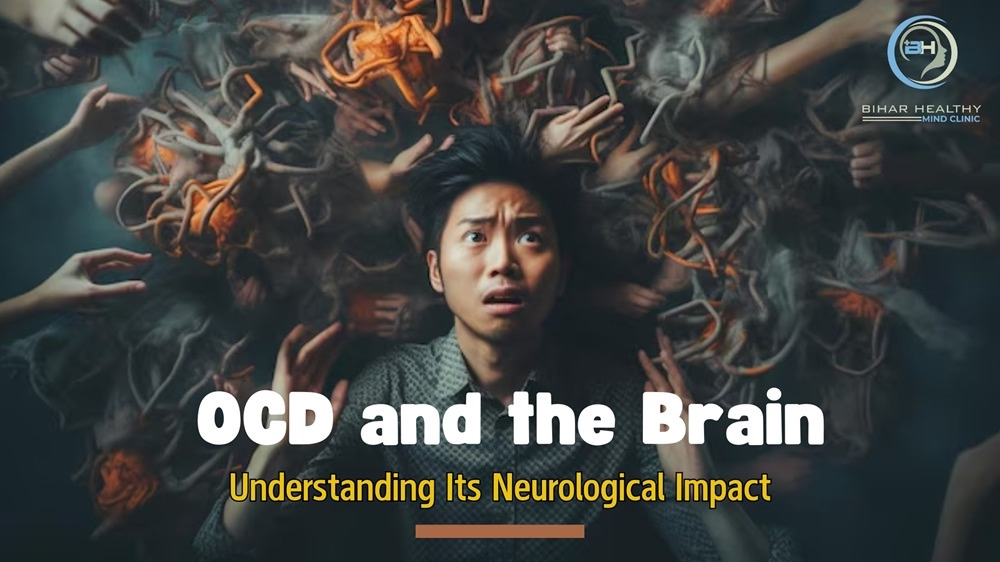
Obsessive-Compulsive Disorder (OCD) is more than just repetitive behaviors or intrusive thoughts, it is a complex psychiatric condition with deep neurological roots. Understanding OCD brain function helps both patients and caregivers grasp the nature of the disorder and the rationale behind treatment approaches.
At Patna Psychiatry, under the guidance of Dr. Saurabh Kumar, MD (Psychiatry), we emphasize a scientific yet compassionate approach to mental health care. This blog explores what part of the brain OCD affects, how it impacts brain function, and whether OCD causes long-term damage to the brain.
What is OCD?
OCD is a mental health disorder that involves the development of:
- Obsessions: Persistent, unwanted thoughts, images, or urges.
- Compulsions: Repetitive behaviors or mental acts performed to relieve anxiety caused by obsessions.
About 2–3% of people worldwide are impacted by OCD, with symptoms typically starting during teenage years or early adulthood. It is known to interfere significantly with daily life, relationships, and overall well-being.
OCD and Brain Function: The Science Behind It
1. The Cortico-Striato-Thalamo-Cortical (CSTC) Circuit
Research has identified the CSTC loop as central to OCD brain function. This neural circuit connects:
- Orbitofrontal Cortex (OFC): Involved in decision-making and evaluating risk.
- Anterior Cingulate Cortex (ACC): Regulates emotional responses and attention.
- Basal Ganglia (specifically the caudate nucleus): Processes habit formation and motor control.
- Thalamus: Functions as a communication hub connecting various areas of the brain.
In people with OCD, this loop is overactive. The feedback system that tells the brain an action is “complete” doesn't function correctly. For instance, even after locking a door, a person with OCD may feel the urge to check it multiple times.
2. Neurotransmitters and OCD
The brain chemistry of individuals with OCD is also distinct. Notably:
- Serotonin: A critical neurotransmitter, often found at reduced levels in individuals living with OCD.
- Glutamate and Dopamine: These neurotransmitters may also be imbalanced, further contributing to obsessive and compulsive behaviors.
What Part of the Brain Does OCD Affect?
- Orbitofrontal Cortex (OFC): Hyperactivity here is linked to the constant evaluation of perceived threats or mistakes.
- Caudate Nucleus: A malfunctioning caudate nucleus may prevent the brain from filtering unnecessary thoughts, causing persistent obsessions.
- Thalamus: An overactive thalamus keeps the compulsive loop active, reinforcing the obsession-compulsion cycle.
- Anterior Cingulate Cortex (ACC): Involved in error detection, its heightened activity results in exaggerated feelings of doubt or error, often fueling compulsive checking behaviors.
Does OCD Damage the Brain?
This is a common concern, especially among patients. The short answer is: OCD does not structurally damage the brain in a way that leads to permanent deterioration, like in Alzheimer's or other neurodegenerative diseases.
However, functional changes are evident:
- Prolonged OCD may lead to gray matter volume changes in regions like the OFC or the ACC.
- These changes are reversible to some extent with consistent psychiatric treatment, therapy, and lifestyle modifications.
- Untreated OCD can lead to cognitive fatigue, stress, and comorbid conditions such as depression, which may further strain the brain's function over time.
How is OCD Treated?
At Patna Psychiatry, treatment is individualized and holistic. Options include:
- Cognitive Behavioral Therapy (CBT): Especially Exposure and Response Prevention (ERP), CBT helps individuals confront obsessions without engaging in compulsions.
- Medications: SSRIs, or Selective Serotonin Reuptake Inhibitors, are frequently used to help regulate serotonin balance.
- Neuromodulation Therapies: In severe, treatment-resistant cases, techniques like Repetitive Transcranial Magnetic Stimulation (rTMS) or Deep Brain Stimulation (DBS) are considered.
Can Brain Function Improve With Treatment?
Yes. Research and clinical evidence suggest that the OCD brain can ‘retrain’ itself through therapy and medications. Neuroplasticity allows the brain to form healthier pathways over time. Regular psychiatric care, like that offered at Patna Psychiatry, supports long-term recovery.
When to See a Psychiatrist?
If you or a loved one experience:
- Repeated intrusive thoughts
- Excessive hand washing, checking, or counting rituals
- Intense anxiety often linked to recurring obsessive thoughts
…it may be time to consult a specialist. Seeking early intervention from the Best Psychiatrist in Patna can significantly improve outcomes.
Why Choose Patna Psychiatry?
Dr. Saurabh Kumar, MD (Psychiatry), has years of clinical experience treating OCD and related disorders. The clinic offers a calm, professional environment with scientifically backed treatment protocols tailored to each patient's needs.
Conclusion
Grasping the brain-based roots of OCD can help combat stigma and stress the need for early treatment. Though OCD alters brain function, it does not cause irreversible damage. With therapy, medication, and expert guidance, recovery is possible and lives can be transformed.
If you're searching for compassionate and scientific mental health support, Patna Psychiatry is here to help.
Disclaimer: All characters and events depicted in this blog are entirely fictional. Any resemblance to actual persons, living or dead, is purely coincidental. The content is intended for informational purposes only and should not be considered as medical advice. Always consult a qualified healthcare professional for medical concerns.
Visitors: 140





No comments yet.